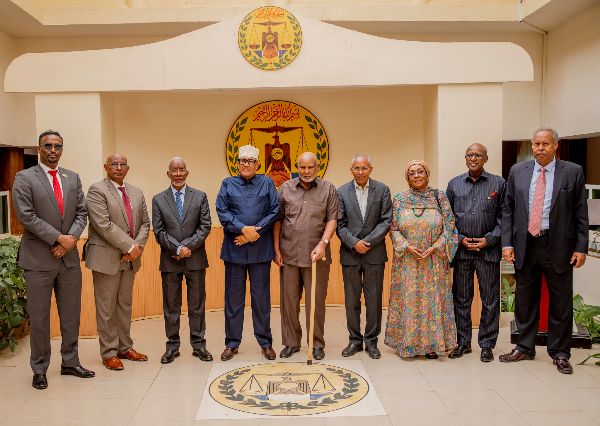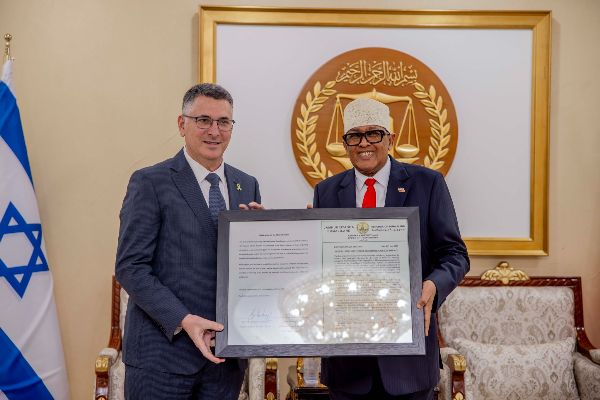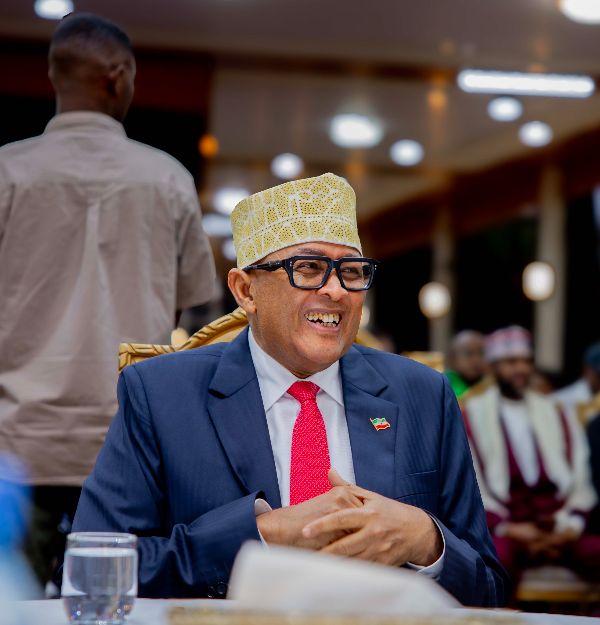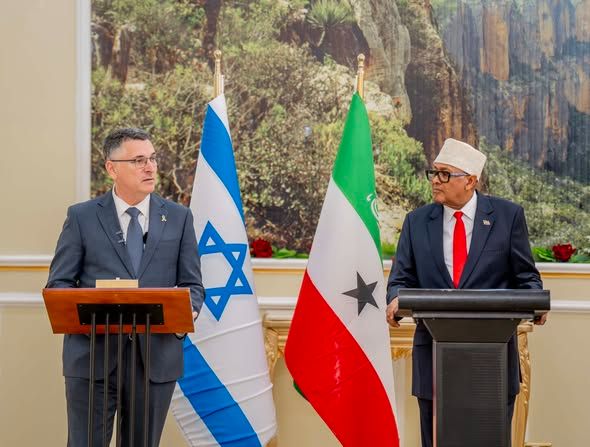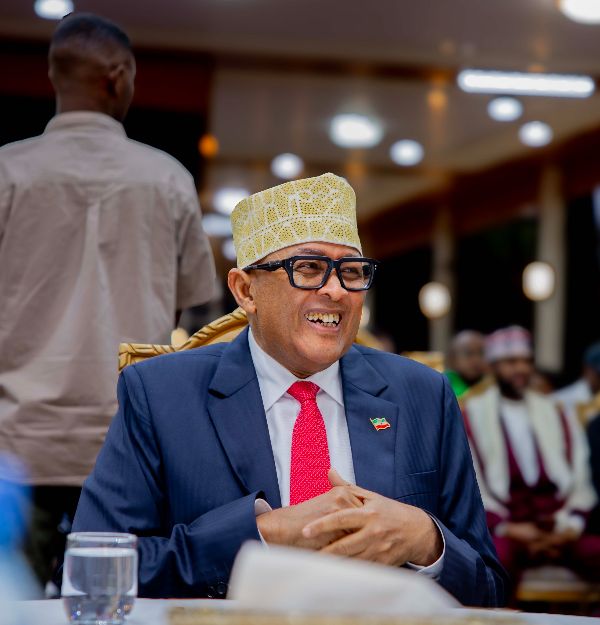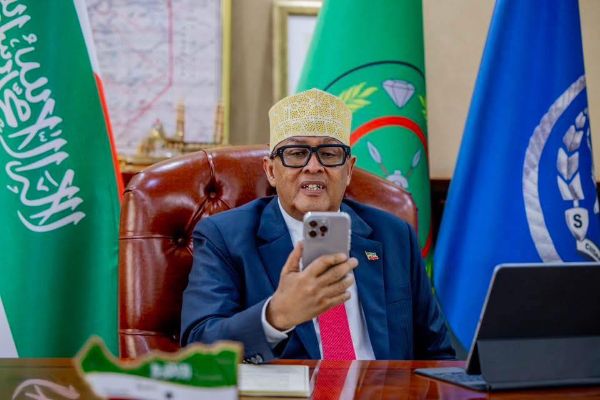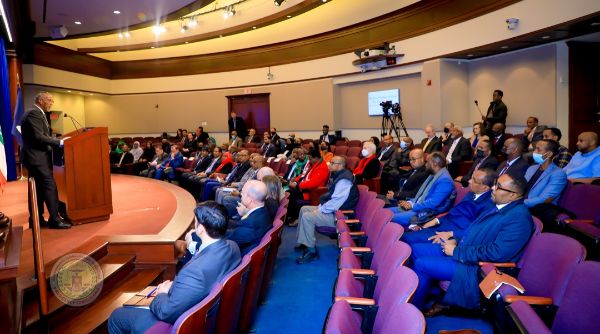
Remarks by President of the Republic of Somaliland H.E Muse Bihi Abdi at the Heritage Foundation on March 14, 2022
The Republic of Somaliland
Remarks by
President Muse Bihi Abdi
The Heritage Foundation
March 14, 2022
- Introduction
Good afternoon, I would like to extend my sincere gratitude and appreciation to Dr. Kevin Roberts, President of the Heritage Foundation, for inviting me to give this address today.
The Heritage Foundation stands out among America’s leading public policy institutions for promoting a truly interdisciplinary approach to understanding the politics and economics of East Africa. It is therefore a great pleasure and an honor for me to exchange views today on Somaliland and the future of our region with such distinguished participants.
Ladies and Gentlemen
Today the whole world is laser focused on the tragedy in Ukraine. The shelling, the bombardment, the destruction, the death, the mass suffering and the largest refugee crisis in Europe. Today, the suffering of the people of Ukraine is unfolding in front of our own eyes with the help of 24/7 news cycle and the social media. For us this tragedy is reminiscent of the genocide committed against our peope 33 years ago. A tragedy I myself witnessed first hand and which over 50,000 of our people were massacred at the hands of Somalia government and more than a million of our people became either refugees or were internally displaced. We feel the pain and the anguish that the people of Ukraine feel today because we went through the same experience. Only in our case the genocide committed against our people was hidden from the world as at that time there were no 24/7 news cycle or the social media. However the bitter memory of what we went through is forever memorliazed in our minds and will never be forgetten.
Ladies and gentlemen: I come before you today to talk about my country’s progress, challenges and the role my country plays in the security, stability and economic development in our region and beyond.
- Somaliland’s journey toward independence
Somaliland first gained independence and international recognition on 26 June 1960. Five days after independence, Somaliland united volunatarily with Somalia with the aim of creating a “Greater Somalia” comprised of five former colonies inhabited by citizens of ethnic Somali origin ( British Somaliland, Italian Somaliland, French Somaliland, the current Somali Region of Ethiopia and the then Northern Frontier District of Kenya). Unfortunately this union, which was never legally formalized, became more bane than boon. The dream of a greater Somalia not only did not materialize but caused untold suffering and devastation for the Somali ethnic group and the broader Horn of Africa region.
The hastily arranged union became untenable for Somaliland as our people were subjected to increasing autocratic rule and oppression from Mogadishu. Initally the civilian government of Somali Republic through administrative takeover reduced Somaliland to the status of junior partner in the union. This power grab and deliberate domination did not go down well with our people and they start to resist Somalia’s design of domination.
Early dissatisfaction with the union led the majority of Somaliland voters to reject the unitary constitution in a June 1961 referendum, and in December of that year Somaliland officers launched an unsuccessful coup in Hargeisa, with the aim of restoring Somaliland’s independence.
The military regime that seized power in October, 1969 continued systematic discrimination against the people of Somaliland. The formation of the Somali National Movement (SNM) in 1981 was a manifestation of the discontent of the people of Somaliland. Any attempt by the people of Somaliland to seek their lawful rights was met with extreme brutality, extra-judicial executions, disappearances, arbitrary arrests, detention, and torture.
in May 1988, the SNM launched successful assaults gainst Hargeisa and Burao. The conflict erupted into full-scale civil war. The military regime answered with indiscriminate bombardment and deliberate targeting of civilian population. Hargeisa, the Somaliland capital was razed to the ground. Other cities were also systemically targeted and destroyed. The regime’s genocidal actions were in effect an act of ethnic cleansing. Evidence of widespread war crimes committed against the people of Somaliland has been fully documented by the United Nations Special Rapporteur for Human Rights and a forensic team from Physicians for Human Rights, as well as the Somaliland War Crimes Commission.
After the collapse of the Somali state in 1991, the people of Somaliland decided to withdraw from the union and re-assert Somaliland’s sovereignty and independence – in full compliance with international law and the charter of the African Union. To fully understand the Somaliland people’s desire for independence, all we need is to look at the tragic history of oppression, human rights violation, and genocide experienced by the people of Somaliland at the hands of Somalia government.
In the three decades that followed, the people of Somaliland built a functioning state, a successful market economy and a vibrant democracy.
Inclusive and transparent elections, have been a critical element in the consolidation of the Somaliland state and its validation by our people.
These elections, which in recent years have been among the first to use advanced iris biometric verification technology, are widely endorsed by international observers as free and fair and have led to repeated peaceful and orderly transfers of power. These include Somaliland’s combined parliamentary and local councils elections last May, held in the midst of COVID-19 pandemic. We look forward to continuing this tradition with more elections later this year.
My country, Somaliland, is often celebrated for our functioning, stable and democratic state in an otherwise volatile region. We do not wish to be extraordinary. But similarly sustained democratic progress in our part of the world is rare.
We have deterred terrorists from our land and pirates from our coastal waters.
Somaliland is rightfully very proud of the security, stability, and democracy we enjoy, and I am pleased to say we celebrated 30 years of independence in May of last year. Somaliland has now been outside the union with Somalia more than we have been inside the union.
We are confident that, in time, the world will come to acknowledge what an African Union fact-finding mission to Somaliland concluded in 2005 – that Somaliland’s search for recognition is ”historically unique and self-justified.” And our ultimate goal remains: to gain international recognition as an independent nation and assume our rightful place within the international community. Yet while we maintain this aspiration, in the short-term the focus of our diplomacy is deeper engagement with those who share our values – especially the United States. This pragmatic and patient approach has helped Somaliland emerge in recent years as a reliable partner in a critical region.
- Somaliland’s geopolitical significance and shared interests with like-minded countries.
First, the security situation in Somalia has deteriorated dramatically, provoking a reevaluation of the political considerations that impeded more direct engagement between the U.S. and Somaliland.
As you will recall, the U.S. reestablished diplomatic ties with Somalia in 2013, guided by a vision of an empowered central government in Mogadishu that could build domestic unity among disparate clans, degrade and defeat extermism and protect its people and its neighbors from the scourge of terrorism and instability.
That vision was not realized.
Today, even those most committed to empowering the Mogadishu government have lost faith in the project. Time and time again, Mogadishu’s partners have expended financial resources, diplomatic resources and military resources, with little to show for the effort.
Regrettably, after nearly a decade of good intentions by Mogadishu’s partners and considerable U.S. and international assistance, the Somalia government lacks legitimacy and struggles to exercise its authority beyond Mogadishu. It remains a source of instability in our fragile region.
The second major development is that the Horn of Africa has become a region of heightened strategic importance. In a difficult neighborhood, Somaliland’s stability and reliability is increasingly recognized as an asset for advancing the interests of countries who share the same values.
In recent years, the stability of the Horn of Africa has also been challenged by conflicts in the region, as well as the constantly evolving operations of terrorist groups. Instability and food insecurity is further exacerbated by drought, desertification, locust swarms and climate change effects.
Simultaneously, the Bab el-Mandeb Strait has emerged as a vital strategic link in maritime trade routes connecting the Atlantic Ocean and Mediterranean Sea to the Indian Ocean. Significant portion of the world’s oil passes through Bab el-Mandeb, as well as considerable trade between Europe and Asia. Its importance is reflected in the expansion of foreign military bases and buildup of naval forces in the Red Sea, as well as enhanced international cooperation to fight piracy and ensure maritime security.
Great power competition in Africa will continue for the foreseeable future. In this environment, the United States should make clear its support for governments that embrace democratic governance and stability in the midst of threats, instability and external pressure.
The Third major development is Somaliland’s emergence as a trade and shipping hub.
The modernization of the Port of Berbera, the opening of a new international airport and construction of commercial corridors to inland neighbors are connecting the Horn of Africa to global trade routes, serving as a linchpin for renewed economic development in East Africa.
Last June, our government and DP World inaugurated a new container terminal at the Berbera Port, marking the completion of the first phase of a significant port expansion project. This was followed in October with DP World and Britain’s development finance agency announcing plans to jointly invest significant amount of money in logistics infrastructure in Africa, starting with the further modernization of Berbera Port.
These investments, combined with ongoing challenges in neighboring countries, make Somaliland the most stable and reliable conduit between much of East Africa and the world’s major shipping lanes.
Taken together, these three developments – the challenges the international community confronts in the Horn of Africa, its increasingly strategic importance, and Berbera's potential to create a new economic engine for the region – mean that Somaliland is poised to became a key player in global security and economy.
- Somaliland/Somalia Dialogue
The Somaliland/Somalia dialogue started with the London Conference of 23 February, 2012. Article 6 of the London conference stated that” “the conference recognized the need for the international community to support any dialogue that Somaliland and TFG (Transitional Federal government) or its replacement may agree to establish to clarify their future relations.”
The key point here is to clarify the future relations between the two countries. Therefore, in order to clarify the future relations between the two countries, the core issues of the dispute, namely the status of Somaliland, would have to be addressed and resolved.
Despite nine rounds of talks between 2012 and 2022, the expected outcome of the talks, resolving the core issues of the dispute, the status of Somaliland, never materialized as there were no political breakthrough. The limited agreements made on the peripheral technical issues were never implemented as Somalia reneged on all of the agreements made. During those ten years Somalia has demonstrated complete lack of interest in meaningful dialogue. In fact Somalia has used the dialogue to pursue policies aimed at weakening Somaliland’s independence and its ability to develop including weaponizing international aid and economic development.
Given that there has been no progress over the last ten years since the dialogue between Somaliland and Somalia started, Somaliland believes that the dialogue had failed to achieve its objective. The reasons for the failure lies entirely with Somalia’s efforts to undermine the dialogue process as demonstrated by its harmful actions, willful disregard of the agreements made and its intransigencies.
Given that dialogue is not an option for Somalia as demonstrated by its conduct, bad faith and continuous sabotage of the dialogue, Somaliland believes that it is unfair to Somaliland to be beholden to a dialogue process that has failed to achieve its objective and has no hope of succeeding. It is difficult to imagine that what has not been achieved in 10 years can be achieved in one or two years.
Somaliland therefore believes that there is no future in the continuation of dialogue with Somalia and is prepared to pursue all available avenues for international recognition.
Given above, Somaliland believes that the international community has a moral obligation to support Somaliland’s pursuit of international recognition.
- The merits and promise of closer US-Somaliland collaboration
In fact, this chapter has already begun. From regional security to democracy promotion to economic development, the objectives and values sought by the United States align entirely with Somaliland’s vision.
Recent months have seen an increase in engagement and collaboration, including productive visits by Somaliland Foreign Minister to Washington, and the recent visit to Hargeisa by a delegation of senior U.S. congressional staff – a historic first for Somaliland.
I am very heartened by these developments. But sustained direct dialogue and partnership is needed if we are to effectively address the growing challenges and truly advance our shared security, economic and governance objectives in the region.
An important foundational element of this partnership is the establishment of a permanent U.S. diplomatic presence in Hargeisa. Several nations – including Ethiopia, the United Kingdom, Denmark, Kenya, Taiwan, Turkey and the UAE – have diplomatic offices in our capital, and the United States should join their ranks. With this presence and regular visits by senior U.S. officials, we will be able to cooperate more closely in a number of key areas.
Let me briefly highlight a few areas where Somaliland’s capabilities and proven track record can be a valuable resource for the like-minded countries.
As I noted earlier, Somaliland has successfully deterred threats to our homeland and piracy in our territorial waters. Our Coast Guard works with partners such as the UK to guarantee the safety and security of maritime trade through the Red Sea and Gulf of Aden, and we work with foreign partners and international NGOs to minimize illicit trafficking and smuggling networks. We have much to offer in terms of community-based security successes, and closer collaboration with the U.S. on these efforts would advance shared interests and strengthen its needed presence in the region.
Similarly, our recently modernized infrastructure, particularly the Port of Berbera, is well-positioned to support security operations, logistics and humanitarian aid, as well as expand commercial opportunities throughout the region. We appreciate the U.S. government’s interest in Berbera and hope discussions will continue to explore utilization and further development of what could be a vital gateway for trade, investment and security collaboration.
On governance issues, Somaliland’s democratic government is the only one of its kind in the region. It serves as a beacon for our neighbors and others whose citizens seek opportunities to engage in the democratic process. Over the last 30 years, we have built our democratic norms and institutions and ensured more than three peaceful transitions of power.
We are aware that there are still certain issues to be addressed to ensure that our electoral process is more perfect. We are working on ways and means, within our laws, of enhancing the role of women in our political process and increasing their participation, as candidates, in future elections.
Somaliland has much to offer others seeking to build their own democratization processes. From updating voter registration systems to ensuring the objectivity of national election authorities, and from managing polling stations to facilitating the work of independent election monitors, we have 20 years of practical experience to share. We would welcome greater partnership with the U.S government and civil society organizations to advance democratic norms in our region and elsewhere – and to further improve our own institutions.
- Conclusion
In a troubled region that has experienced significant setbacks for democratic governance and continues to face serious threats from terrorists and other violent extremist groups, the successes of Somaliland are no small achievement. Our friends in the United States understand this, and we are grateful for their continued engagement and support.
Yet this is just the beginning. We can and must work more closely together if we hope to compete with – and overtake – those who seek further instability and dependency in our region.
There are so many practical and important steps we can take. And with each one, Somaliland will demonstrate to our partners and the world that our ultimate goal of international recognition should be granted.
As an equal with other nations, Somaliland will be able to contribute even more effectively to a sustainable and prosperous future for the Horn of Africa, building on our own experience in forging an oasis of stability in a long-troubled region.
The road ahead may be long, but I am more confident than ever that Somaliland will be able to count on U.S. support as we pursue shared objectives and journey toward our long-deferred destination: a free, sovereign, and democratic Somaliland.
Thank you.




